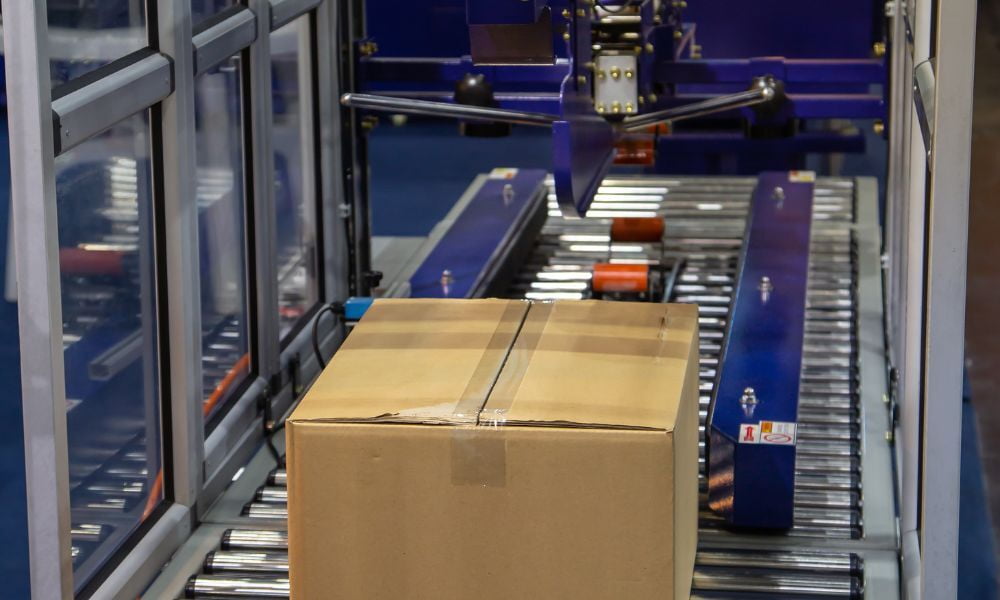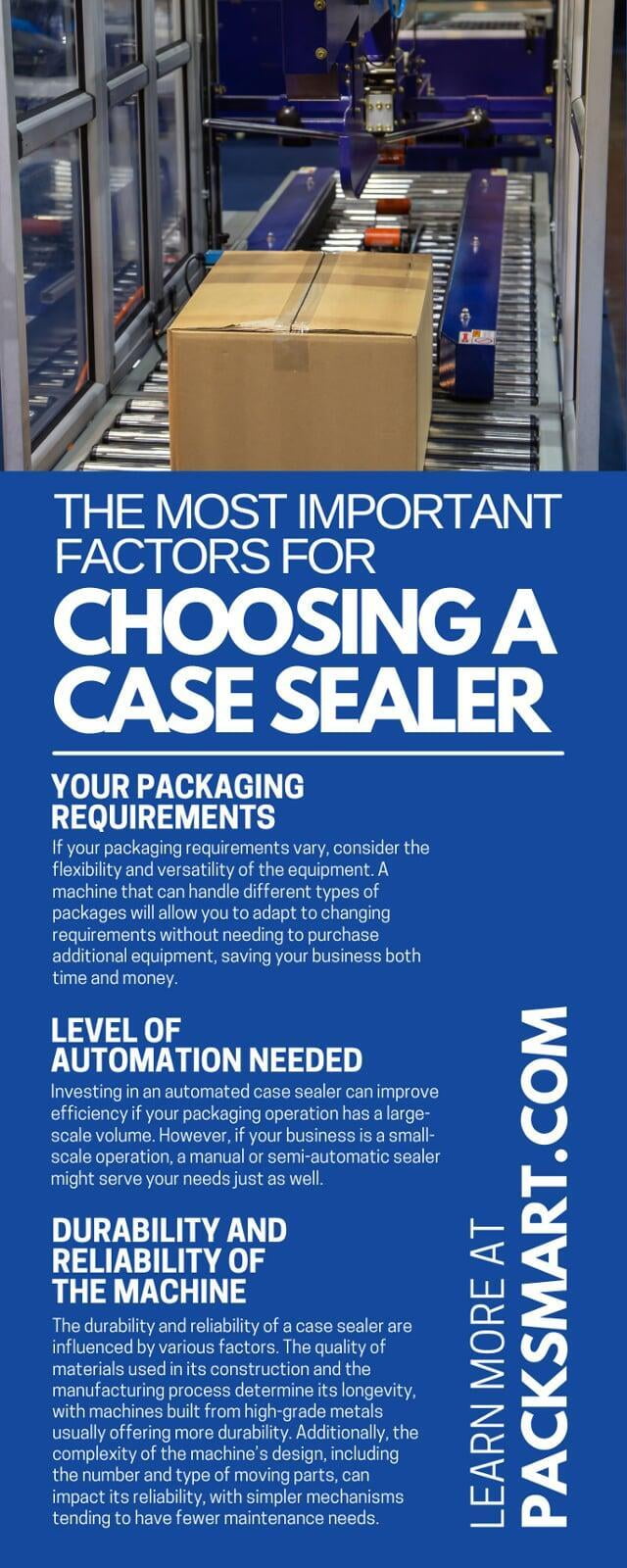
A case sealer, also known as a carton sealer, streamlines the process of sealing boxes for transport or storage. These machines can greatly enhance efficiency, ensuring packages are sealed consistently and swiftly, reducing human error and improving the overall workflow.
Ranging from manual to fully automatic, case sealers can adapt to different production scales, making them a versatile solution for businesses of all sizes. Learn about the most important factors for choosing a case sealer to improve operational efficiency and case quality.
Your Packaging Requirements
Having a clear understanding of your packaging requirements will help you identify the sealer type that caters to your business’s needs. To make an informed choice, consider the range of packaging sizes and types of cases you need sealed.
If your packaging requirements vary, consider the flexibility and versatility of the equipment. A machine that can handle different types of packages will allow you to adapt to changing requirements without needing to purchase additional equipment, saving your business both time and money.
Package Size
The dimensions of your boxes will determine the size and type of sealer suitable for your operations. Make sure you consider both your smallest and largest packages to ensure the machine can handle the range.
Package Type
The types of packages you handle also play a vital role in your case sealer choice. Different case sealers are designed to handle different materials and package forms. Whether you work with regular slotted cartons, full overlap cartons, or other styles, there’s a case sealer designed to handle your specific needs.
Evolving Packaging Needs
Remember that your packaging equipment may need to accommodate diverse package forms if your business expands to include new product lines requiring different packaging designs. Additionally, seasonal changes or promotional campaigns might necessitate the use of unique or varying package types. A versatile carton sealer can adapt to your evolving requirements and prevent the need for additional equipment.
Level of Automation Needed
Case sealers can be manual, semi-automatic, or fully automatic. That’s why one of the most important factors to consider when choosing a case sealer is the level of automation your business requires.
Investing in an automated case sealer can improve efficiency if your packaging operation has a large-scale volume. However, if your business is a small-scale operation, a manual or semi-automatic sealer might serve your needs just as well.
Durability and Reliability of the Machine
No one wants to spend money on a machine that breaks down frequently or requires constant maintenance. Therefore, the durability and reliability of the case sealer should be a top priority.
Opting for a high-quality machine will reduce the risk of operational downtime, ensuring seamless productivity. It will also lower long-term maintenance costs, providing a higher return on investment.
The durability and reliability of a case sealer are influenced by various factors. The quality of materials used in its construction and the manufacturing process determine its longevity, with machines built from high-grade metals usually offering more durability. Additionally, the complexity of the machine’s design, including the number and type of moving parts, can impact its reliability, with simpler mechanisms tending to have fewer maintenance needs.
Ease of Use and Maintenance
A user-friendly machine will save you time and effort, enabling your team to increase their productivity levels. Furthermore, training new employees to operate the machine should be a quick and easy process.
Additionally, consider the simplicity of maintaining the machine and the availability of spare parts when needed. A good case sealer should have an easy maintenance process and readily available replacement parts, ensuring minimal downtime in the event of any repairs or expected maintenance.
Safety Features
A safe working environment promotes employee well-being and can improve overall productivity. Ensure the machine you choose has appropriate safety features, such as emergency stop buttons, protective guardrails, and other mechanisms that help prevent accidents and potential injuries. For instance, safety sensors can halt operations immediately if an irregularity is detected, and lockout/tag-out mechanisms can prevent unexpected equipment startup, effectively mitigating risks and ensuring worker safety.
Essential Safety Tip: Train All Operators Before Use
Every machine has its own safety features, meaning operators must understand their functionality. Read through the manufacturer-provided hazard warnings in the owner’s manual, and require employees to undergo safety training before touching or operating any machinery.
Cost and Value for Money
While the upfront cost of new equipment is essential, purchasing managers should also evaluate the machine’s value in the long run. A high-quality machine might require a larger initial investment but could save your business money over time through increased efficiency and reduced maintenance costs.
You can focus on the following features to determine the carton sealer’s value:
- Efficiency: This encapsulates the speed and precision of the machine. Efficient equipment provides value by reducing labor costs and increasing productivity.
- Versatility: This includes the machine’s ability to handle different types and sizes of packages. Versatility adds value by catering to varied packaging needs without requiring the purchase of additional equipment.
- Longevity: This involves the durability and reliability of the machine. Longevity directly affects maintenance costs and operational uptime, thereby influencing the machine’s total cost of ownership.
Supplier’s Reputation and Support
Finally, it’s crucial to partner with a reputable supplier who offers excellent customer service. A trustworthy supplier is known for delivering quality products consistently and adheres to ethical business practices. Choosing a reputable supplier for your case sealer means that you can expect a high-quality machine, which in turn ensures efficient and smooth operations for your business.
After-Sales Service
Beyond just providing the product, support from the supplier is equally valuable. A supportive supplier is one that provides comprehensive customer service, both before and after the purchase. They can guide you through the purchasing process, answer any questions you might have, and assist you in choosing the best case sealer for your needs.
After the purchase, a supportive supplier can provide you with replacement parts, should you need any, and offer guidance on using and maintaining the machine for optimal performance. The right supplier will ensure that your equipment runs smoothly and efficiently.
The ideal packaging equipment can greatly influence your business’s productivity and efficiency. Paying attention to aspects like packaging requirements, level of automation, durability, and safety features will help you make an informed choice. Remember, the cost should not be the only factor you consider; the value for money, supplier’s reputation, and after-sales service are equally pivotal for reliable equipment that provides a solid return on investment.

